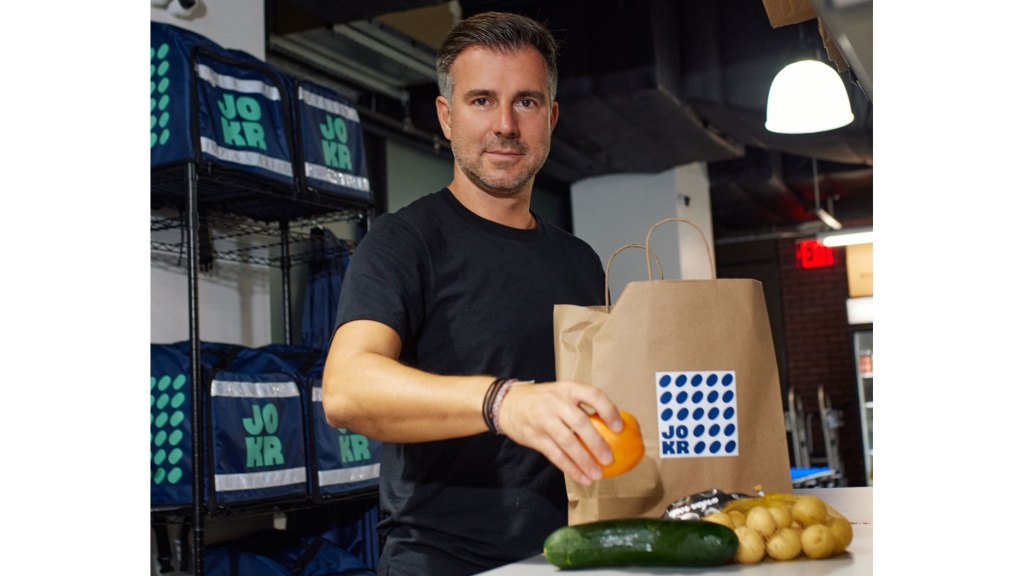After a challenging few months that included closing markets, instant grocery delivery company JOKR told TechCrunch it raised about $50 million in a Series C investment on a $1.3 billion post-money valuation.
The funding, which The Information first reported that JOKR was seeking last September, follows a $260 million raise announced in November 2021. However, with the valuation the company is getting a slight bump, up from the $1.2 billion post-money valuation from the Series B.
“It’s not a huge uptake in terms of valuation, and obviously something that, despite the market correction, still shows that we’ve been able to build traction to grow and to become more profitable,” JOKR co-founder and CEO Ralf Wenzel told TechCrunch. “Otherwise those terms would not have been justifiable. We’re happy about the fact that we closed the Series C round and it comes at an increased valuation from new and existing investors.”
The new investment was buoyed by existing investors, with G Squared leading the round and GGV Capital, Tiger Global Management and HV Capital participating. In total, JOKR has raised $480 million in equity and debt since being founded in 2021.
Instant grocery delivery startup JOKR bags another huge round to enter unicorn status
Difficult decisions
Wenzel went after the new funding “to make sure that we have a fully funded business plan and that we can become fully self-sustainable and don’t have to be more dependent on external capital.”
It has indeed been quite a roller coaster ride for the company in the last year. In its report, The Information said that JOKR was losing $10 million a month. Wenzel confirmed the company is “still losing money,” but that this figure included countries and cities in which it no longer operates, so the losses have narrowed to single-digit millions of dollars each month currently.
JOKR hit gross-profit status last April, but was swept into the challenging economic environment that affected the instant grocery delivery sector, stemming in part by people returning to grocery shopping in person as the pandemic eased, a slowdown in venture capital investments and the war in the Ukraine.
As such, at the beginning of summer 2022, the company cited “global economic uncertainty” as the reason for announcing it would shutter its New York and Boston deliveries. Then this month, it officially left Colombia after previously closing locations in Medellin and Santiago, Chile in November. The company continues to operate in Brazil, Mexico and Peru, but is discussing strategic options for both markets to foster its focus on the Brazilian market, according to Wenzel.

The decisions derived from an ongoing assessment of its different business units, and a determination of where JOKR has the best chance at balancing growth and profitability, Wenzel said.
“It’s not a ‘winner takes all market’,” he said, but more like a “’winner takes most market’,” he added.
Asked how he can be optimistic about JOKR’s future when the instant grocery delivery sector is challenged more broadly right now, Wenzel said it boils down to a different balance between long-term growth and short-term profitability and also the company’s focus on profitability over geographic spread.
“We, therefore, took the decision to fully focus on geographies that match these expectations and are on a clear path to profitability, without compromising on our vision and customer promise or sacrificing the huge long-term growth potential in one of the largest underpenetrated regions in the world,” he said.
In addition, JOKR focused on customer experience, which is why, he said, the company consistently has a Net Promoter Score above 80.
“We sincerely believe that e-commerce needs to respond to increasing customer demand for relevance, reliability sustainability and joy,” he added. “JOKR is focused on building a new generation of retail, through vertical integration and superior data science and technology. We achieved full operating leverage with positive gross margins within just one year and kept growing ever since.”
Food delivery company JOKR confirms closing of Santiago, Medellin operations
Unbagging instant grocery delivery
The instant grocery delivery sector was at its peak during the global pandemic when fewer people were leaving their homes. Startup companies were coming online in droves and attracting some serious venture capital.
However, as the virus became something we all had to learn to live with, people returned to their normal in-person grocery shopping behaviors. This left much of the quick-commerce sector to find out if their business models could survive in a crowded space, just as capital became scarce.
“Some [delivery startups] are most certainly safe — especially the ones with positive unit economics,” Matt Birnbaum, the former head of talent acquisition at Instacart and now a talent partner at Pear VC, told my colleague Kyle Wiggers back in June. “The good delivery companies can slow their spend in growth areas like hiring and marketing and become profitable almost immediately. The companies that are in the most danger are the ones who don’t have a clear path to profitability in the short or medium term. As access to capital has become more constrained, so has the appetite for growth at all costs.”
Unfortunately, what resulted were announcements of companies buckling against the strain and being acquired or folding over the past year. For example, Buyk, Fridge No More and Zero Grocery ceased operations — with Zero doing so just weeks after announcing a new funding round. We also saw some of the giants, like Gopuff, announce staff reductions, as did Zapp.
Meanwhile, my colleague Ingrid Lunden reported on Turkey-based Getir acquiring German competitor Gorillas, which had been “exploring strategic options” since May and had laid off staff. This was after Getir itself had announced plans to cut its global workforce by 14% and slow down expansion plans.
Grocery delivery startups with low margins might drop IPO dreams for M&A reality
Delivering for Brazil
Having faced layoffs and market closures, Wenzel said the continued investor confidence is proof that where JOKR is headed today and tomorrow is on the right track. The Series C round closed in December.
Meanwhile, Wenzel said business in Brazil “has been thriving, growing consistently and getting more profitable.” Brazil accounts for 50% of JOKR’s business, and the new funding will enable the company to double down in this region while it looks strategically at other geographies. He adds that the company is gross margin positive in Brazil and expects JOKR to reach full profitability by the first quarter of 2024.
Brazil is a big market for on-demand grocery delivery. It’s been growing, on average, 32% each year since 2019, and together, the market generated an estimated $3.1 billion in revenue in 2022. The market is expected to grow about 10% each year through 2027, which would effectively double the market, according to Ken Research.
The market also has some fierce competition. Some of the big players serving the country include iFood, Rappi and Mercado Libre. Uber Eats had been on that list until early 2022, when it announced it was closing its business there.
Brazil is also big enough that players from other parts of Latin America can come in and take a sizable chunk of market share. Mexico-based online grocer Jüsto entered the market in October 2021 and told TechCrunch in 2022 that it was seeing monthly growth between 30% and 40% and that the market already represented 25% of Jüsto’s revenue. In addition, Diferente, a new Brazilian online grocery delivery company, saw average order volume increase for its produce boxes go from 13.8% to 17.2% in the past 10 months.
Perhaps faster delivery times were a poor choice from a unit-economics perspective
Next steps
Instant grocery delivery is here to stay, but the future of how the companies operate might look different in the way they generate revenue. For example, DoorDash is now returning packages for customers.
However, Wenzel maintains that JOKR’s plans to increase revenue won’t be “achieved on the back of the customer.” Instead, the company’s vertically integrated infrastructure enables it to go to local producers to source food and to charge customers the same prices they would see in the grocery store.
“Brazil’s domestic food production is not dependent on imports,” he added. “You can vertically integrate because 90% of the food that is being consumed in Brazil is being produced in Brazil. This is not so doable in the United States or Europe and is why it has allowed us to unlock a very high margin of operation.”
Got a news tip or inside information about JOKR, grocery delivery or another topic? I’d love to hear from you. You can reach me via Signal at 832.862.1051. Or drop us a note at tips@techcrunch.com. Happy to respect anonymity requests.
Editor’s note, March 1, 2023, 5:49 a.m. PST: Jokr clarified that the $1.2 billion valuation from the Series B was a post-money valuation.































Comment